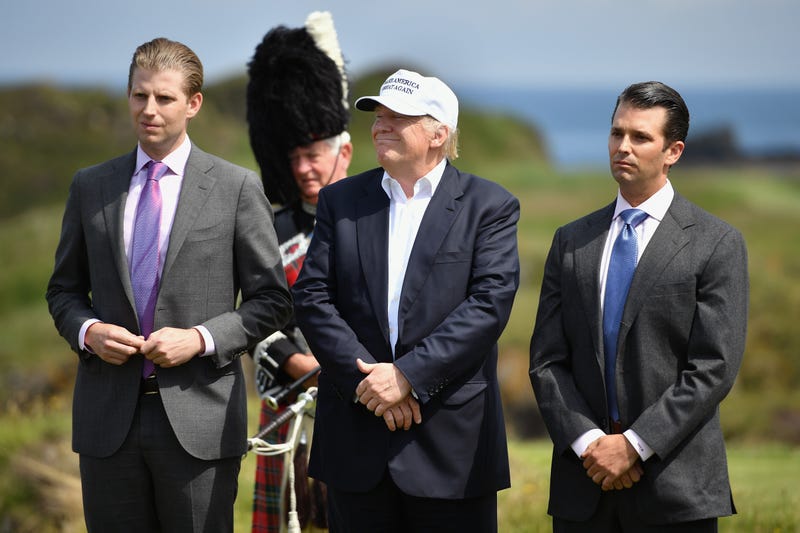According to Wikipedia, the medal is given for "An especially meritorious contribution to the security or national interests of the United States, world peace, cultural or other significant public or private endeavors."
https://sports.yahoo.com/trump-says-tiger-woods-presidential-medal-freedom-175549428--spt.html

“There are so many ways he just throws up all over golf,” Rick Reilly told The Ringer’s Bryan Curtis for a story that was sort of about Reilly’s active retirement and also about Reilly’s new book on President Donald Trump’s life of crime on the golf course. That book is called Commander In Cheat, and while Reilly does his best to disavow any political reasons for writing it—“I don’t know much about politics, but I know golf,” Reilly told the AP, “and it really offended me, not as a voter or as a citizen—just as a golfer”—it is inarguably a political document.
It is a stretch to say that the book represents any sort of political awakening on Reilly’s part; while Reilly seems shocked and dismayed by the authentically shocking and dismaying stuff that Trump has done, noticing that it’s disgusting to lock children in cages doesn’t necessarily bespeak the birth of a revolutionary political consciousness. Curtis notes that Reilly follows both Krassenstein brothers on Twitter, which is objectively a terrible thing to write about anyone but which also seems more like a sign of where Reilly is in his life—comfortably into The Paddleboard Years, and comfortable enough in that stage to enjoy periodically puncturing his bulletproof leisure with reminders that stupid and preventable catastrophes are happening, somewhere far away.
A portrait emerges. Trump tees off first and then tootles down the fairway in his golf cart, where he either kicks his drive onto the fairway or just plays a ball hit by someone else in his party; people that play with him are forever arriving to find that Trump has chucked their ball into a bunker—this apparently happened to Mike Tirico during a cursed round that he and Ron Jaworski played against Trump and Jon Gruden—or miraculously discovered that a ball Trump hit into a water hazard has emerged, dry, on the other side. Trump loves to declare himself the winner of the championships at his various clubs, and awarded himself a club senior championship at the course he owns in Bedminster, New Jersey, despite not even playing in the event; he took the score he claimed from a round he played at the Trump Philadelphia club that day, transposed it to Bedminster, an entirely different course, and gave himself a trophy. “A caddy tells Reilly that Trump’s golf cart once contained a can of red spray paint, and that Trump marked trees his balls hit with a red ‘X,’” Curtis writes. “The trees were removed the next day.”
It’s probably true that any person defective enough to want to become president is also the sort of person that would cheat at golf; these stories feel believable in the same way that every story about, say, Aaron Rodgers fuming over ping-pong games he lost in 2007 feels too true to doubt. Any story about Trump telling a gratuitous and overstated lie on his own behalf is believable on its face; the idea of him being both extremely competitive and stupendously lazy about actual competition is self-evidently right. There may be a bigger argument to make where all of this is concerned—that Trump, as Curtis has it, “sees a golf course like he does the Oval Office”—but there’s no real reason to make it, because no one is arguing against it. Of course Trump will take whatever he believes he can get away with, because there is no ethical force within him or meaningful countervailing discipline in the broader society that compels him to stop, and of course he is deeply dedicated to winning in the most sloppy and stupid sense. He’s not a complicated man, and none of this was ever much of a secret.
The value of all these stories, then—every tree cut down because it angered Trump by stepping in front of an errant iron, every shameless lie he told about shots transmogrifying onto the fairway from the bottom of a boggy water hazard, every gilded club championship trophy he handed himself—is not in the picture they paint in aggregate, but in their laughably petty particulars. Trump, like many other people with more money than actual worth, is the sort of person who would cheat at golf. He’s also nothing more than that, and whether his greatest lies and worst crimes undo him or not, it’s the little lies—the ones he tells because he can’t handle even the small sting of truth inherent in a duffed approach shot—that show his towering smallness most clearly. Every stupid story rephrases the same obvious truth, and reveals the same essential thing. The man at the center of it, lying and hacking and zooming away in his whining little cart, is too small for a grand critique.